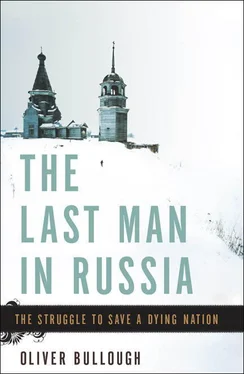‘How far have you come to go to the wrong village? From London?’
I stood stupidly in the sun. I could not help but smile. Galya’s laughter was irresistible. I was probably already a local legend: the daft foreigner with a notebook who couldn’t read a map.
‘Get in,’ the man said. ‘I’ll take you to the bus stop. You’ve got a long trip if you’re going all the way to Unecha.’
Galya, who was still giggling, left me at the bus stop. She wanted to have a proper conversation with her mother and thought the old women might have calmed down by now. I could hear her still chuckling as she walked away. At last the bus came, and I was heading in the right direction.
When I finally found the narrow road to Father Dmitry’s real home village, far to the west and a day’s journey away, it was possible to imagine that nothing had changed here not only since he was born in 1922, but for centuries before that too. Conifers formed a spiky horizon all round. Potatoes sprouted from sandy fields. Sparse crops of barley ran right up against the walls of log-built houses.
But the impression was illusory. The peasants here in western Russia were some of the doughtiest enemies the Bolsheviks ever faced. They had to be prised away from their ancient customs like a child from its mother. The assault on them was merciless, their defeat was total, and their lives changed for ever. In the face of the onslaught, peasants clung to all that they could salvage: to their faith, Orthodox Christianity.
Orthodoxy is made up of ancient rituals and chants and processions that believers lose themselves in. Icons are objects of adoration, and churches have tiered screens to separate the priest conducting the mysteries from the waiting faithful. Orthodoxy claims descent from the faith of the earliest times, which is why it is so resistant to change – a characteristic reinforced in Russian villages where reform remains distrusted.
Father Dmitry never wrote much about his childhood, but from what he did record it is clear that his home was deeply religious. His father, an ordinary farmer with a stubborn face in photographs, kept a Bible in the house. His small son would secretly read it to himself. He played at being a priest, taking an ember and a candle, and filling the hut with smoke. He gave communion from a glass of water to all his friends, who treated the event, he said much later, with great solemnity.
Playing was not something they did much of, in those days, however. The Bolshevik state was only newly established, and its economy was wrecked by civil war and international blockade. Before the revolution, the government had barely troubled the peasants, beyond demanding taxes. Once the tax collectors were gone for the year, the only official they saw was the constable. The Soviets were different.
Communist officials confiscated the peasants’ crops to feed the cities. They had machine guns and the farmers were powerless to resist them. One winter, troops came and took the last wheat from Father Dmitry’s family: the grain they needed to live on and to plant for the next year. His father, the bearded tyrant who ruled his household and read the Bible, lay on the ground and wept. Dmitry, his brothers and his mother wept too.
His sister was married by then, but her husband left for Ukraine to try to find food for his wife and young child. He was not heard of again. Abandoned, she struggled into the nearby town of Unecha with her baby to beg for food from the townsfolk. The baby cried and cried. He needed to be fed, she said, as often as a kitten. Her milk dried up, and she tried to appease him with water but he cried still more.
Finally, the baby calmed and slept. Her begging had failed and she had fed him nothing, but at least he was not uttering the unignorable screams of a hungry infant. She struggled on in her fruitless quest for food. It was only when she got back home that she realized he was dead. Desperate with grief, she ran to her own mother. She walked around their hut in her grief, until she found an edible plant in the garden. She dropped to her knees to eat it, but Dmitry was too fast for her. He ran out into the garden and slammed her round the head with a pole.
‘What did you do that for?’ his mother demanded.
‘We all want to eat,’ he replied. He wrote later that he was pleased he had defended their food store, even from his own sister.
The family had planted rye, which they guarded jealously until it grew large enough to be eaten. The children awoke one day to find their grandmother had broken into their garden and was eating the immature seeds. She could barely walk she was so hungry, but the brothers drove her out of their crop like a cow. When they had pushed her out, they began to throw lumps of earth at her. She sank to her knees and cursed them.
Dmitry’s grandfather was also a religious man, and he built his own church out in the fields where he recited what he could remember of the old services. He was hungry and begged food. Their neighbours beat him and he lost his mind. The children then teased him and laughed at him, throwing stones. Once he caught Dmitry and thrashed him.
When Dmitry was already in his teens, he and his father gathered to mark Easter, the holiest date in the Orthodox calendar. Dmitry held his homemade cross while his father read the holy service. Stalin’s government wanted to force the peasants to give up their own property and merge it into a single collective farm. The new farms would be efficient and mechanized, and would provide the food surpluses the Soviet state needed so that it could industrialize. In effect, the peasants’ labour, livestock and land would be taken from them and used by the government for someone else’s benefit.
It is not surprising that many of the peasants wanted nothing to do with the new farms, but the government was determined. It sent squads of city folk into the villages to force the peasants to take part.
Recalcitrant peasants were taxed at a rate 70 per cent higher than their collectivized neighbours and, even after selling all their valuables, could rarely afford to pay what the state demanded. That is what happened to Father Dmitry’s father, who refused to join the collective. He was charged with tax evasion. His insistence on maintaining the old religious rites was added to the charge sheet. He was, under the new legal code on the young judge’s desk, conducting religious propaganda. He and Dmitry had to walk 3 kilometres to the courthouse in another village.
‘Why have you not paid the state?’ asked the judge.
‘I have not paid, yes… there’s nothing to pay with… I live badly,’ his father replied.
‘And why don’t you join the collective farm? There you will live better.’
‘Well, I can go into the farm, if I have to.’
The judge gave him two years in jail. He was one of the approximately 25 million Soviet citizens repressed – shot, deported, imprisoned, exiled – in the years between Stalin seizing power in 1928 and dying in 1953. That is an eighth of the Soviet population, approximately two people for every three families. Tens of millions more suffered by association. As relatives of ‘enemies of the people’, the families of the convicted prisoners too were denied many of the rights of citizens. Dmitry, the son of a class enemy, knew that his troubles were in many ways only now beginning.
After his father’s conviction, they sat for a while but had nothing to say. When Dmitry returned home alone, his mother was inconsolable. The sentence was extended, and those two years became four. The boys begged and stole food to keep themselves alive.
The collective farms were key to Stalin’s plans to turn the Soviet Union into a modern state capable of standing up for itself. They would break the old traditions, forcing the peasants to do the state’s will and to become pliant proletarians. They would also create a surplus of food to be exported so the Soviet Union could import the tools and equipment needed to modernize the economy. In this they succeeded. By stealing the peasants’ food, the government won its crash industrialization. As Stalin’s supporters say: when he arrived, Russia had wooden ploughs; when he died, it had the hydrogen bomb. The collective farms were not a long-term success, however. By the end of communism, Moscow was paying as much for imported grain as it was earning from exporting oil. Grain yields per hectare were a third of those in Germany, although the Soviet Union had some of the richest land in the world.
Читать дальше












